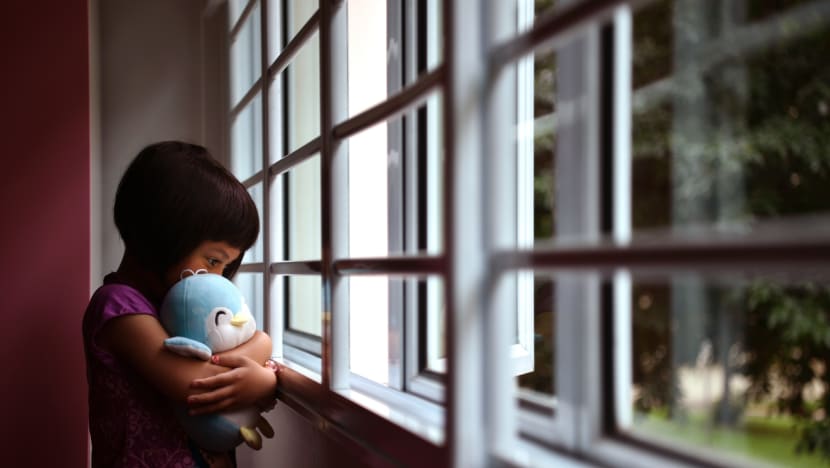When grief begins before death: How to help children cope with the loss of a parent
Younger children could express grief through somatic symptoms such as headaches or stomachaches, said one medical social worker.

Photo illustration of a child suffering from loneliness and depression (Photo: Jeremy Long)

This audio is generated by an AI tool.
SINGAPORE: Ms Noor Mazura’s children were aged two, 11 and 12 when her husband died of oesophageal cancer in 2019.
They coped with it in different ways. Her eldest son, who has autism, pulled at his hair until he became bald while her other son became withdrawn.
“His studies dropped, he quit soccer. He didn't want to mix with friends (and) he got very angry,” she said.
The toddler did not understand what happened and would ask when her father was returning, she added.
Ms Mazura went for grief counselling and sought help for her children as well. “It was really tough. I took about a few months to come out from my own space. I had to grieve myself first before I go to them,” she told CNA’s Singapore Tonight on Monday (Nov 27), in line with the Children’s Grief Awareness Day that is observed in November.
HOW CHILDREN EXPRESS GRIEF
Medical social worker at HCA Hospice Koh Yuqi@Umairah Khairiya, who was also on the show, said that for children, grief starts when a parent is diagnosed with an illness and continues as the parent goes for treatment and physically deteriorates.
They may struggle with understanding why the parent fell ill and eventually died, and find it difficult to come to terms with the death, she said.
She added that children may grieve differently depending on their age and developmental stage.
“They may not have the words or the space to articulate their thoughts and their emotions. Therefore, their grief may be expressed through their behaviours. For example, some children become more withdrawn from social activities, while others tend to have more temper tantrums or they become easily irritable,” she said.
Grief may show up in other ways as well, with some children sharing that they develop sleep problems, such as difficulty falling asleep, and intense and scary nightmares that disrupt their sleep.
“For younger children, grief can be expressed through somatic symptoms such as headaches or even stomachaches. For the older children, they may have difficulty concentrating in school and that may relate to a decline in their academic grades,” she said.
HOW TO HELP A GRIEVING CHILD
HCA Hospice helps about 150 children below 18 cope with grief from the loss of a parent every year.
Ms Koh said that adults may tend to want to protect a child from the bad news of death and dying. In some cases, the adults themselves may not have the emotional capacity to attend to the child. However, withholding information from them may not work, she said.
“Some adults also have the misconception that the child will not understand at all. However, from our work with children, we have learned that when children are not given factual information, they tend to make up stories by themselves, which may not be helpful for the grieving process,” she said.
She gave the example of an eight-year-old boy who thought that he was the one who caused his mother to fall ill, and his six-year-old sister who was told by her friends that harming herself was the solution.
Along with the medical social worker, HCA Hospice roped in an art therapist and other professionals to educate the children on their mother’s condition.
“It is very important for adults to pay attention to children who are experiencing loss. It is also important for us to create this network of care to support children who are grieving. This could be informal support such as from extended family members, or even from a school system such as the school teachers and school counsellor,” she said.
She added that studies have shown that when childhood grief is not addressed, it may impact mental health in adulthood.
CHALLENGES PARENTS FACE
However, addressing children’s grief can be a challenge for adults with already too much on their plates.
Parents toe a delicate balance between addressing personal challenges and turning their attention to their children, said Ms Gracia Lim, senior medical social worker and programme lead at HCA Hospice.
“Sole breadwinners wrestle to juggle work, attending to a sick spouse and taking on more childcare responsibilities. Medical expenses, existing loans and complex family dynamics exacerbate the already stressful situation,” she said.
“With emotional capacity stretched to its limits, offers by social workers on the home hospice team to support the child are sometimes refused due to unpreparedness or hesitance to fully acknowledge the situation.”
She noted that the topic of death remains taboo in Singapore’s society. However, with the lack of awareness comes the lack of attunement to attend sensitively to the needs of the children, she said.
“In the face of loss, impending or otherwise, our collective focus as a society should shift towards illuminating pathways to awareness about children’s anticipatory grief and bereavement, their ability to cope, and the accessible avenues where help can be sought,” she said.
For Ms Mazura, coping with day-to-day life without her husband involves taking every opportunity with her children to remember him.
“We cannot (get) over the death, but we live with it,” she said.
“(I) keep talking about him. Even though daddy is not around, he will be (with) us. He’ll always (be a) part of us.”
















